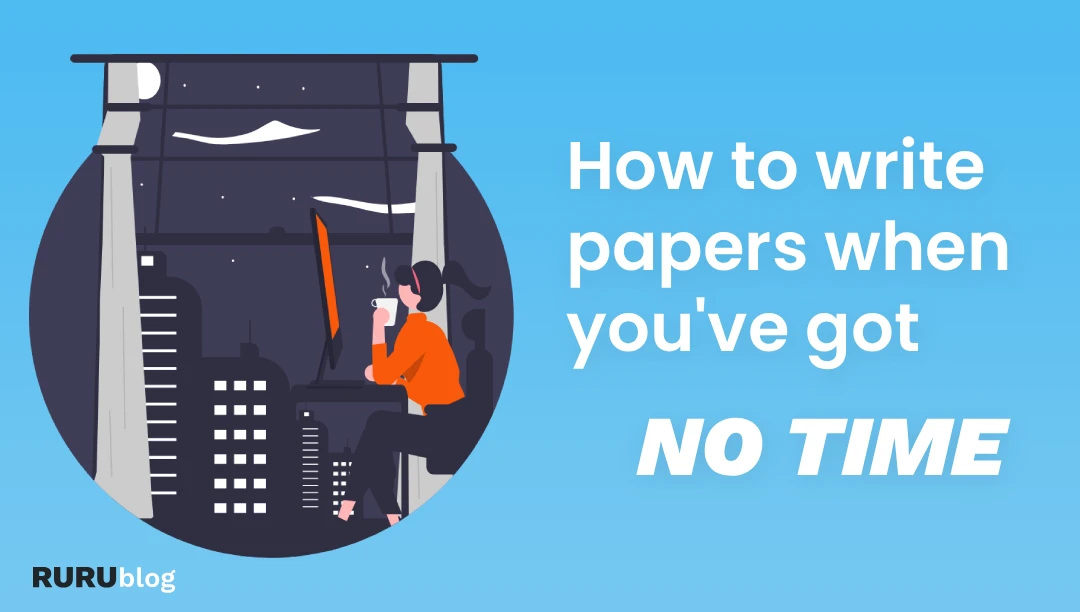Blog • Posted on Aug 10, 2025
Paper Writing When You Have A Job: A Guide for Working PhDs
Writing an academic paper while working full time can feel impossible. You’ve got deadlines at work, personal commitments at home, and yet somehow you’re expected to publish high-end research. If writing that paper has been on your to-do list for months, you’re not alone.
In this article, I’ll share useful strategies that help working PhDs like you make consistent progress and finish their papers. The key is to fit writing into your existing life schedule, not bending your life out of shape to accommodate writing.
Key Takeaways
- You can write an academic paper while working full time by breaking it into small, consistent writing sessions.
- Protect short, regular time slots for writing instead of waiting for big chunks of free, uninterrupted time.
- Use tools like reference managers, note-organising apps, and AI helpers to save time on menial tasks.
- Track small wins and reward yourself to stay motivated and keep your paper moving toward submission.
Table of Contents
- Key Takeaways
- Why Writing Papers Feels So Hard When You Work Full Time
- How to Make Writing Feel Possible Again
- Finding Small Windows of Time for Writing
- Quick Writing Techniques for Busy Researchers
- Tools That Speed Up The Writing Process
- Staying Motivated In Your PhD
- When and How to Get Help
- Final Thoughts on Writing Papers While Working Full Time
Why Writing Papers Feels So Hard When You Work Full Time
Look, you don’t have the luxury of an empty calendar like most full-time PhDs. You can’t spend hours, days, weeks figuring things out in the absence of other stressors.
You’re:
- Exhausted from work
- Struggling to make time for exercise and social outings
- And maybe mentally drained from parenting kids
It’s rare for you to get a couple hours of uninterrupted time to work on your PhD. And when you do, half of that time is wasted trying to switch out of work or family mode.
It’s no wonder your paper isn’t getting written. The good news is, you can do something about it. You’ve just got to make a plan that takes your life into account.
How to Make Writing Feel Possible Again
The first step to regaining control is to stop waiting for perfect writing conditions. We’d all love to write our papers from a luxury resort on a tropical island with a population of one, but it ain’t happening.
You’re better off finding chunks of time that are consistently free. They might not look like much in isolation, but stack ten 30-minute writing blocks in a row and you’ve put 5 hours of thinking down on paper! That’s not nothing.
Here’s the thing: if your schedule only leaves you with snippets of free time, your writing schedule (by necessity) has to match that. Wait for the perfect time and you’ll never write a word!
Another useful perspective shift is to stop treating your draft in such high regard (it’s a draft!). Instead of treating it as a pre-production masterpiece, treat it as a thinking tool.
Tell yourself: “This draft is a place for me to record my thoughts on the subject”. Because in all likelihood, you’ll end up formulating, structuring, and re-wording those thoughts at a later date.
If you never give yourself the freedom to simply word-dump, you won’t have any subject matter to rearrange. And that’s all paper writing is: the arranging of thoughts into a cohesive story.
You could even separate drafting and editing into different sessions in your calendar to help with adopting this new mindset.
Finding Small Windows of Time for Writing
It’s all too easy to say “I have no time”. But do you really have no time?
Take a moment to audit your day:
- How much time do you spend commuting?
- How much time do you spend eating lunch?
- What time do you get up?
- Could you get up earlier without losing out on sleep?
- How much time do you waste watching series in the evening?
I’m not suggesting you skip sleep or time for yourself. But it’s surprising how much time we waste doing things that don’t actually get us closer to our goals.
And when you audit yourself and write it down, you can start to identify small windows of time where you can write that academic paper while working full time.
Aside from the small windows, it’s worth scheduling one writing session per week that is non-negotiable. This is actually an act of love to yourself.
This is you saying: “My goals matter and I’m taking time to make sure I am making consistent progress toward them”.
It doesn’t have to be a huge block of time. Even one hour is sufficient to move the needle when done consistently.
By the way, if you struggle with paper writing, you can get daily tips straight from me to your inbox here (it's completely free).
Quick Writing Techniques for Busy Researchers
The Pomodoro Technique
This productivity technique leverages short bursts of effort to maintain concentration and avoid mental overload. When you work without breaks, your concentration and effectiveness inevitably decline at some point. To avoid this, the pomodoro technique breaks work up into 25-minute stints.
Set a timer, work for 25 minutes, then take a 5-minute break. Get up, stretch your legs, go outside and stare at the horizon… do anything but look at your screen. After the break, set the timer and repeat.
Do this up to four times (if you have that much time for concentrated work) and then take a real break of 30 minutes. You’ll be surprised how much you get done working like this.
Here’s a browser-based timer I use to avoid having my phone near me during the stint.
Speech-to-Text Drafting
This one is a game changer. Half the time when you struggle to write, it’s because you’re too focused on trying to write well. But here’s the thing. You’re writing a draft. Again, a draft. The purpose isn’t to write what will be the final words of your manuscript the first time. It’s to get words down on paper - any words!
The easiest way to achieve that when you’re tired and unproductive is to use a speech-to-text service like Otter.ai. It’s a quick and easy way to get words down without having to make time for the perfect writing session. Heck, you could record yourself talking through your introduction on the drive to work. That transcript then becomes your first draft!
Eat the Elephant
You know the saying… “one bite at a time”, right? Sounds simple enough. But that only works when you already know the small parts of the bigger task ahead of you. What if you don't?
You might know the sections of an academic paper, but how much finer of a resolution can you break that down into? This is where working with a PhD mentor can really make the difference. A mentor (like me) will teach you how to break your paper down into smaller and smaller chunks, until essentially every sentence is planned.
When you’ve got a plan, all you have to do is execute. It’s like baking a cake with the recipe right in front of you. Not only is it easier than winging it, but it also ensures you actually end up with a cake and not some frankenstein amalgamation of random baking ingredients that vaguely resembles a cake (i.e., your current draft).
OK, enough baking metaphors (it was actually a simile, but moving on).

We Help Working PhDs Finish Faster & Publish More Through:
- 1-On-1 Mentoring - Real people. Real results.
- Professional Editing - Our team of expert editors will get your manuscript publication-ready.
- Online Courses - Learn invaluable presenting & writing skills.
Tools That Speed Up The Writing Process
The right tools can eliminate a lot of the menial tasks behind writing, freeing up your time for the stuff that matters most.
Reference softwares like Zotero and ResearchRabbit keep all your sources organised and format your citations in seconds. No more scrambling to remember how paper ‘X’ relates to paper ‘Y’.
AI tools can speed up brainstorming, improve clarity, and help you refine your wording. I recently reviewed 17 AI tools that every PhD student needs to know to save time, which included my personal favourites that I use every single day without fail.
A note-organising tool like Obsidian or Notion can help you keep research notes, outlines, and ideas all in one searchable place. Linking related notes like this makes it easier to pull together ideas when you’re ready to write.
The less time you spend on repetitive tasks, the more time you have to think. And that’s all writing is: structured thought.
Staying Motivated In Your PhD
Writing academic papers can feel never-ending, especially when you can only work on them in short bursts. The key is to keep the momentum going even when progress is slow.
Start by tracking your small wins. This could be as simple as ticking off each sub-section of your paper in a notebook or moving sticky notes from a “To Do” to a “Done” column. Seeing your progress grow visually helps you stay connected to the bigger picture.
Share your progress with a trusted colleague, friend, or mentor. A quick weekly check-in—even just a text—can keep you accountable and give you a boost when you feel stuck.
Reward yourself for milestones, no matter how small. Academia is notorious for lacking a reward system. So you’ve got to make the effort yourself. Finishing a tricky section might earn you a coffee from your favorite café. Submitting a draft to a co-author could mean taking the night off to watch a movie or go out with friends.
The more you pay attention to the progress you are making, the easier it feels to push for that final submission.
When and How to Get Help
If you are struggling to write papers as a part-time PhD, there’s no need to suffer in isolation. The right kind of help can speed things up and take some of the burden off your shoulders.
Professional editing makes a big difference when you’re trying to write papers with no time. An editor can polish your language, improve clarity, and make sure your paper meets journal requirements, so you can focus on the research.
I reviewed 12 of the best academic editing services available online here.
Mentorship offers both accountability and direction. A mentor can help you set realistic writing goals, keep you on track, and offer guidance on how to tackle tricky sections and navigate the publishing landscape.
Collaboration with co-authors can also lighten the load. If you have colleagues who are invested in the work, splitting the writing or analysis between you can keep the project moving forward even when one person is busy.
Getting help is not a sign of weakness. It is a strategic choice that can speed up the paper writing process and keep you sane (you’ve got enough going on!).
FAQs
How can I write an academic paper while working full time?
Break your work into small, manageable tasks. Use short, focused writing sessions instead of waiting for large blocks of time. Tools like reference managers and note-organising apps can speed up the process.
What is the fastest way to write a research paper with a busy schedule?
Start with a clear outline, use templates to structure your work, and keep editing separate from drafting. This avoids slowing down your initial writing flow.
How do I balance my job, personal life, and writing papers?
Plan your week to include protected writing slots, even if they are short. Use unused moments like commutes or lunch breaks for small, high-impact writing tasks.
Should I get help with writing my paper?
If you are short on time or struggling to make progress, getting help from a mentor, editor, or co-author can be a smart move. They can speed up the process while improving quality.
Final Thoughts on Writing Papers While Working Full Time
Trying to write an academic paper while working full time can feel daunting, especially when your day-to-day life is already packed to the brim with other commitments. But by finding small windows of time, using some smart tools and strategies, and changing your mindset a little, you can make consistent progress without risking burnout.
Start small. Pick one of the strategies above to try today and see how you get on. Remember to record and reward your progress. And don’t forget to ask for help when you need it!
Dr. Matt Biddick is Founder & Mentor at RURU. You can book a free call with him here.


